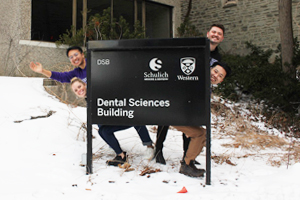Feature: Peer program supports wellness

By Jennifer Párraga, BA'93
A new peer support program for dentistry and medicine students has become part of the comprehensive wellness delivery program that the School offers to students in these demanding professional programs.
Created by students from both programs, the Schulich Peer Support Program complements the offerings from the Learner Experience Office and will focus on creating a community of support for students.
Zachary Weiss, Medicine Class 2022, and Brittany Pollock, Dentistry Class of 2023, have been championing this new initiative that they say was a long time coming.
With an interest in mental health and well-being and experience with mental health advocacy, Weiss had wanted to find a way to bring about change at the School for medical students. In the spring of 2020, he was inspired by the faculty-led Peers for Peers Program. After doing some research and meeting with Pollock, they decided to collaborate on a program that would support dentistry and medicine students.
 Andrew Nguyen, Medicine Class of 2024, and Troy Chow, Dentistry Class of 2024, joined Weiss and Pollock in their work on the Program, which provides another resource and coping tool for students. Dr. Sandra Northcott, Associate Dean, Learner Experience serves as the faculty advisor for the Program.
Andrew Nguyen, Medicine Class of 2024, and Troy Chow, Dentistry Class of 2024, joined Weiss and Pollock in their work on the Program, which provides another resource and coping tool for students. Dr. Sandra Northcott, Associate Dean, Learner Experience serves as the faculty advisor for the Program.
“We are hoping to normalize and encourage help-seeking behaviour,” said Weiss. “But this isn’t about replacing a formal counselor or providing a crisis line.
“Professional counselling at our School is offered through the Learner Experience Office,” added Pollock.
As part of their services, the Learner Experience Office has increased their counselling services with the addition of two new counselors, one each for the London and Windsor campuses.
Students who are interested in connecting with a peer through the Peer Support Program are asked to fill out an application form that outlines their goals for support and then be matched with a peer supporter.
“We ask the peer supporters to fill out a similar form so that we can be sure to make strong matches,” Pollock said. “And we’ll try to match students with the peers in their own programs.”
“There is a huge diversity of students at our School,” said Weiss. “No matter what you are experiencing, there is likely someone who has experienced something similar or who is on the other side of it. We really hope students recognize this and reach out.”
Nearly 50 students applied to serve as peer supporters, and 24 were initially identified following an interview process. The selected students completed a training session led by Northcott.
The peer supporters in training spent a weekend engaging in sessions about effective listening, learner mistreatment, racism and discrimination, cultural competencies and crisis management, as well as doing role-playing to build confidence for their personal interactions.
It was important to Weiss and Pollock that support was always there for the peer supporters, so they have established an on-call schedule for easy access should it be needed.
“Between the four of us – Brittany, Andrew, Troy and I – we’ll be there for the peer supporters,” said Weiss.
Ensuring the continued success, sustainability and continuity of the program, the students have created a leadership structure with two senior and two junior students from each program.
“When Brittany and I graduate, we feel confident that Andrew and Troy can not only carry the program forward but recruit two additional students to join them in their efforts,” said Weiss.
“I hope that in five to 10 years from now this program is still in place and has continued to change to meet the changing needs of students,” said Pollock.
Students interested in connecting with a Peer Supporter can fill in the online form.









